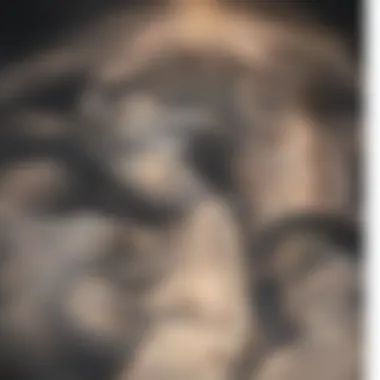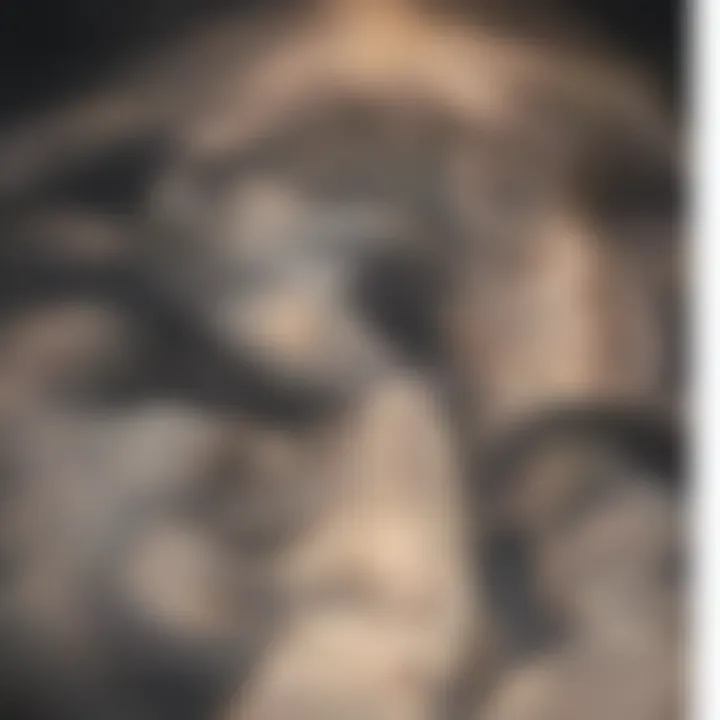Exploring the Reality of Black Magic: A Scientific Perspective


Intro
Black magic, often defined as the use of supernatural powers for harm or malevolence, occupies a notorious place in human history and culture. The term evokes a range of emotions, from fear to curiosity. Commonly perceived as a taboo subject, it raises profound questions about the nature of belief and the boundaries of scientific inquiry. This article seeks to unpack these complex themes by examining how black magic intersects with various scientific disciplines, including psychology and anthropology.
The impact of black magic extends beyond individual beliefs; it can shape societal norms and influence interpersonal relationships. The polarizing nature of this topic lies in its dual existence in both folklore and contemporary psychological discourse. By delving into the historical narratives and cultural implications surrounding black magic, we aim to foster a deeper grasp of its significance in a modern context.
This exploration also addresses the skepticism that often surrounds claims of black magic's effectiveness. Are the experiences attributed to black magic products of psychological phenomena? Or do they point to larger cultural rituals that possess their own form of validity? Through a structured investigation into these questions, we intend to provide clarity on both sides of the argument.
In the sections to follow, we will establish a research overview, detailing the findings and providing essential context. We will also discuss the methodology used in gathering the relevant data, all while maintaining an understanding of the implications for both individuals and society at large.
Intro to Black Magic
The exploration of black magic is a critical lens through which to understand the human psyche, social structures, and cultural beliefs. The importance of defining black magic lies in its multifaceted nature; it is not merely a series of rituals or spells, but a reflection of societal fears, hopes, and the quest for control over the unpredictable world. This topic drives curiosity and shapes discourse, affecting how individuals navigate their reality.
By unraveling the layers of black magic, one gains insight into its historical significance and its implications for contemporary society. It is crucial to approach this topic with an analytical mindset, stripping away biases that are often attached to such phenomena. Understanding black magic involves examining the underlying beliefs and cultural traditions that give rise to it, revealing the social and psychological dimensions that make it resonate with people.
As we delve into the definitional aspects and historical context, we will navigate the complex interplay between belief and skepticism. This exploration not only highlights how different societies perceive black magic but also how it has evolved over time, influenced by changing cultural narratives and scientific advancements. The study of black magic can illuminate broader questions about the intersection of religion, superstition, and empirical thought, which are all pivotal to this article's ambition to provide a balanced and nuanced perspective.
Defining Black Magic
Black magic is often defined as the use of supernatural powers or magic for evil or selfish purposes. This characterization is important, but it is essential to recognize that definitions can vary significantly across cultures and contexts. In some traditions, black magic may be seen as a misinterpretation of natural forces or as a tool for personal gain at the expense of others. It is often contrasted with white magic, which is viewed as benevolent or healing.
Understanding these definitions is not straightforward. The methods and goals associated with black magic can range from manipulating circumstances to inflicting harm. Societal norms and values heavily influence these definitions, resulting in a wide variety of practices that may or may not be considered black magic by different groups.
A comprehensive understanding of black magic requires an examination of the symbols, rituals, and beliefs that underpin it. For many, the line between black and white magic is blurred, and thus understanding black magic often involves navigating an ambiguous moral landscape.
Historical Context
The historical context of black magic provides essential insights into how societal views have changed over time. In many ancient civilizations, magic played a significant role in religious and spiritual life. The Egyptians, for example, had a complex understanding of magic that included both beneficial and harmful practices. Black magic, as it came to be known, was often associated with clandestine practices that defied religious norms.
During the Middle Ages, black magic became a focal point of societal fears, leading to the witch hunts in Europe. These hunts were fueled by a combination of religious zeal, social unrest, and the desire to control women, who were often the primary targets of accusations. This period reflects a broader societal inclination to associate fear of the unknown with punitive measures.
In modern times, the interpretation of black magic has shifted again, influenced by psychological and sociopolitical factors. It is often dismissed as superstition in a scientifically advancing world but remains relevant in cultural narratives and personal beliefs. The historical evolution reveals how deeply ingrained magic, particularly black magic, is in the fabric of human society, bridging gaps between the past and present, belief and skepticism.
In summary, the analysis of black magic requires careful consideration of its definitions and historical transformations. These elements are foundational for understanding the cultural and psychological implications of black magic in contemporary society.
Cultural Variations of Black Magic
Cultural variations of black magic are significant when discussing its implications and interpretations across global societies. Each culture has its own set of beliefs, rituals, and practices surrounding black magic. This section aims to explore these differences, shedding light on how they reflect underlying social norms and anxieties. Understanding the cultural context of black magic broaden our comprehension of human behavior and societal structures.
Global Perspectives
Around the world, the perception of black magic is shaped by local traditions and historical events. In many African societies, practices such as witchcraft are intertwined with community life. These rituals can serve as both a form of social control and a means of addressing grievances. In contrast, in Western societies, black magic is often seen through a lens of superstition or entertainment, especially evident in popular media.
The cultural interpretation of black magic also influences its perceived effectiveness. In regions like Haiti, Vodou is sometimes categorized under black magic, reflecting a complex interplay between spirituality and practical healing methods. These differing perspectives highlight the need for a more nuanced understanding of black magic, free from stereotypes.
- Influencing factors:
- Historical events
- Local customs
- Societal values
Black Magic in Folklore
Folklore plays a crucial role in disseminating beliefs about black magic. Legends and myths often serve to validate cultural practices associated with black magic. Stories of witches, curses, and malevolent spirits populate the oral traditions of many cultures. These narratives not only entertain but also instill caution and respect towards the unknown forces attributed to black magic.
In places like Europe, the witch hunts of the past exemplify how folklore can escalate fears about black magic into severe societal consequences. Folklore also shapes the moral framework within which black magic is viewed, often presenting figures associated with it as either villains or misunderstood agents of power.
"Folklore serves as a vessel for collective fears and aspirations, often manifesting through the lens of black magic."
The representation of black magic in folklore reflects complex human emotions, underscoring the universal need to explain misfortune or suffering. Thus, the study of black magic in folklore is not just about the beliefs themselves but also about what these beliefs reveal about humanity.
In summary, exploring cultural variations of black magic sheds light on the diverse interpretations and practices that arise in different societies. As this topic is deeply woven into the social fabric of cultures, it invites a deeper examination of the meanings attached to beliefs in black magic.
Psychological Aspects of Belief
The relationship between belief and psychology provides significant insight into the appeal and persistence of phenomena like black magic. Understanding the psychological aspects of belief can offer clarity on why such beliefs hold power over individuals and communities. This section will dissect two primary dimensions—cognitive biases and the role of fear—in shaping perceptions of black magic.
Cognitive Biases
Cognitive biases play a crucial role in how individuals process information, especially when it comes to supernatural claims such as black magic. These biases can lead to distorted thinking and reinforce existing beliefs. For example, confirmation bias leads one to favor information that supports their beliefs about black magic while disregarding contradictory evidence.
Other biases include the illusion of control, where individuals believe they have the power to influence random events through rituals or spells. This can make rituals related to black magic seem effective, as practitioners may attribute any positive outcomes to their magical actions. Such cognitive distortions can also create an environment where anecdotal experiences become more potent than empirical evidence which can debunk these practices.
- The most relevant cognitive biases affecting belief in black magic include:
- Confirmation bias
- Illusion of control
- Availability heuristic
People often remember vivid experiences associated with black magic, thereby inflating their significance. This leads to a disproportionate focus on extraordinary events while ignoring the commonplace occurrences that suggest a lack of supernatural influence.
The Role of Fear
Fear is a powerful motivator that greatly impacts the belief in black magic. It can drive individuals to seek out magical solutions to problems that appear insurmountable. Whether it is fear of misfortune, illness, or social rejection, the promise of magical intervention offers a sense of hope. Black magic becomes a coping mechanism for those facing desperation or uncertainty.
Additionally, societal fears often manifest in the imagery surrounding black magic. Historical accounts of witch hunts illustrate how fear can fuel persecution and stigmatization, leading to widespread belief in malevolent forces. The fear of black magic itself can lead to real consequences, such as violence against suspected practitioners or individuals believed to have been cursed.
"The interplay of fear and belief creates a cycle where black magic is both feared and revered, driving further engagement with its practices."
When examining the roots of black magic in various cultures, it becomes evident that fear has often been manipulated. It serves both as a tool for social control and a means of enforcing norms and values. Thus, understanding these psychological components is crucial in dissecting the complex dynamics surrounding belief in black magic.


By analyzing cognitive biases and the role of fear, one gains a deeper comprehension of why black magic retains relevance even in an age increasingly governed by scientific reasoning. This exploration of psychological aspects provides the basis for understanding how beliefs can shape behavior, influence societal norms, and perpetuate age-old traditions.
Anthropological Insights
Anthropological insights into black magic offer a critical understanding of cultural beliefs and practices associated with the concept. This section examines how black magic rituals influence social structures, interpersonal relationships, and community dynamics. By studying these practices, researchers gain a nuanced perspective on the role of belief systems in human societies, enhancing our understanding of the human experience in various contexts.
Rituals and Practices
Rituals associated with black magic serve as mechanisms for expressing cultural identity and community values. These practices can be seen as attempts to manage uncertainty in a world where not everything is controllable or understandable.
Black magic rituals vary widely across different cultures, yet they often share common elements. Here are some key points regarding these rituals:
- Purpose: Rituals may serve various functions such as healing, protection, or the intent to cause harm. They often arise in response to personal or communal crises.
- Symbolism: Items like candles, herbs, and incantations are frequently employed. These tools hold specific meanings within the context of the ritual.
- Community Involvement: Many rituals require collective participation, reinforcing social bonds and shared beliefs within a community.
- Transmission of Knowledge: Rituals are often passed through generations, creating a sense of continuity and tradition in cultural practices.
"The practice of black magic is often a reflection of societal needs and values, revealing the underlying tensions within a community."
Overall, studying these rituals allows anthropologists to uncover how black magic practices are interwoven into daily life and belief systems.
Societal Implications
The implications of black magic extend beyond individual practice; they reach into the fabric of society itself. The beliefs surrounding black magic can impact social hierarchies, governance, and interpersonal relationships.
- Authority and Control: The practitioners of black magic, often seen as sorcerers or shamans, may hold significant influence within their communities. Their power can shape decisions and shape social norms.
- Stigmatization and Fear: In some societies, accusations of black magic can lead to social unrest or violence. Individuals labeled as practitioners may face discrimination, ostracization, or even violence.
- Conflict and Resolution: The belief in black magic can exacerbate existing tensions between groups. Conversely, it can also serve as a form of conflict resolution, enabling communities to address grievances through a shared belief system.
- Modern Relevance: In contemporary discussions, black magic reflects broader issues of belief and skepticism. It challenges established notions of science and rationality, urging societies to grapple with questions of faith and evidence.
By understanding the societal implications, we can better grasp the role of black magic in shaping cultural identities and social structures, providing a comprehensive view of its importance in human history.
Scientific Inquiry into the Supernatural
The concept of black magic often implies elements that are beyond the scope of empirical observation. However, a scientific inquiry into the supernatural provides a framework for examining these beliefs with a rational lens. In the context of this article, it allows us to explore the claims surrounding black magic while maintaining a critical stance. This inquiry is not merely about disproving or dismissing beliefs; rather, it is an attempt to understand how such beliefs can influence societies and individuals.
Scientific inquiry benefits the discourse on black magic in several ways. Firstly, it promotes a structured approach to understanding phenomena often characterized by ambiguity. By applying scientific methods, researchers can gather data, analyze patterns, and draw conclusions from observable behaviors or events linked to black magic practices. Secondly, this exploration can bridge the gap between cultural beliefs and scientific reasoning, providing insights that respect both perspectives. As such, it becomes essential for a more nuanced discussion surrounding the reality of these beliefs.
Empirical Studies
Empirical studies form the backbone of scientific inquiry into supernatural claims, including black magic. Researchers often utilize qualitative and quantitative methods to gauge the impact of these beliefs on individuals and groups. For instance, studies may involve surveys that assess a population's belief in black magic versus its actual effects on their mental health. Through systematic data collection and analysis, researchers can begin to decipher whether the psychological impacts attributed to black magic hold any substantial basis in reality.
"Empirical evidence allows us to either substantiate or refute the claims associated with black magic, providing clarity in a realm often shrouded in superstition."
Additionally, some researchers focus on case studies that delve into specific incidents related to black magic, examining social interactions and outcomes tied to these events. These studies often reveal how belief in black magic can lead to real-world consequences, such as panic or tension within a community. Moreover, they help to illuminate how cultural narratives can shape perceptions and experiences surrounding supernatural claims.
Skeptical Perspectives
Skeptical perspectives play a crucial role in the scientific exploration of black magic. Skepticism encourages a questioning attitude towards established beliefs, particularly those lacking empirical evidence. The skeptical framework invites the integration of critical thought and encourages individuals to seek logical explanations for phenomena attributed to black magic. This approach fosters an environment where dialogue can happen without outright dismissal of beliefs.
Skeptics often point to psychological explanations for experiences regarded as mystical or supernatural. Cognitive biases, such as the confirmation bias, illustrate how individuals can easily interpret ambiguous events as validation of their beliefs in black magic.
- Confirmation bias: People may only seek information that supports their belief, ignoring contradictory evidence.
- Placebo effect: In cases where individuals believe in the effectiveness of black magic, outcomes may stem from psychological effects rather than actual magical practices.
Furthermore, critiques of black magic often address the lack of reproducible evidence. The scientific method relies on consistent and repeatable results to establish theories. In contrast, many claims of black magic, if examined, often fail to meet these criteria, raising questions about their validity. Skeptical perspectives challenge enthusiasts to provide rigorous proof, thereby promoting a more informed understanding of supernatural claims.
The Intersection of Science and Belief
The relationship between science and belief systems is profoundly complex, especially when exploring phenomena such as black magic. Understanding this intersection is crucial for a comprehensive examination of black magic from a scientific perspective. It illuminates how belief shapes experiences and perceptions of reality. The discussion around this connection is essential because it allows for a grounded approach to evaluating the claims associated with black magic and the psychological factors that contribute to those beliefs.
Many individuals often rely on belief systems to comprehend events that seem inexplicable. This reliance not only reflects human curiosity but also the innate desire to find meaning in experiences. When examining black magic, it is important to acknowledge that believers may observe occurrences which they attribute to these practices. As a result, subjective experiences often challenge the objective frameworks established by science.
The acknowledgment of this intersection offers several benefits:
- Insight into Human Behavior: Studying the overlap reveals how fear, anxiety, and cultural factors motivate belief in black magic.
- Understanding Skepticism: Analyzing this area helps scientists understand why some phenomena are readily dismissed while others are explored.
- Framework for Communication: Acknowledge varying perspectives creates room for dialogue between scientific communities and those who hold alternative beliefs.
Exploring the interaction between science and belief not only enhances the understanding of black magic but can also refocus discussions on the broader implications of belief in our lives.
Explainable Phenomena
Black magic encompasses various practices often attributed to supernatural origins. However, when dissected through a scientific lens, many of these phenomena become explainable through more rational means. Psychological factors, such as the placebo effect or mass hysteria, frequently account for experiences perceived as magical or malevolent in nature.
Case studies illustrate this concept vividly:
- Instances of supposed curses might correlate with significant life changes, like illness or unemployment.
- Effects attributed to black magic can often mirror conditions resulting from psychological stress or environmental influences.
By understanding the psychological underpinnings, the community may recognize that beliefs in black magic often manifest through cognitive dissonance, allowing individuals to rationalize outcomes that align with their expectations. As people commonly seek patterns in randomness, behaviors that they interpret as the result of black magic can instead be outcomes of psychological phenomena.
Limits of Scientific Understanding
Despite advances in scientific inquiry, certain aspects of reality remain elusive, raising important questions about the limits of what science can explain. Many who believe in black magic may argue that the scientific approach inadequately addresses the richness of their experiences, often dismissing them as anecdotal evidence.
This presents a significant challenge. Science is constantly evolving, yet it may never fully capture the intimate connections people feel with their beliefs. Some experiences defy easy categorization or direct observation and resist empirical testing. The subtleties of personal experience can blur easily, leading to skepticism among believers regarding purely scientific interpretations.
It is imperative to recognize the distinction between scientific skepticism and outright dismissal of lived experience. As society evolves, beliefs in phenomena such as black magic continue to influence communal understandings, drawing attention to areas where science currently lacks comprehensive frameworks to address beliefs and practices.
"In the study of belief systems, it is the emotions tied to those beliefs that often provide the strongest evidence of their impact."
Accommodating belief and scientific methodologies acknowledges humankind's multifaceted nature. Doing so expands discussions further, allowing both belief systems and scientific inquiry to coexist, ultimately enriching our overall comprehension of such complex topics.
Case Studies
Case studies serve as a vital component of the exploration of black magic from a scientific perspective. They provide illustrative examples that enhance understanding of the beliefs, rituals, and psychological impacts associated with black magic. Through detailed examinations of specific incidents, researchers can gain insights into how cultural narratives shape perceptions of supernatural phenomena.


By analyzing case studies, one can visualize the complexities surrounding black magic, including the sociocultural factors that contribute to its persistence in various communities. In these studies, data can often reveal patterns in behavior and thought processes that underscore the broader implications of black magic beliefs.
Key elements of case studies include:
- Detailed Narratives: They offer rich descriptions of events and beliefs, allowing for deeper engagement with the subject matter.
- Contextual Clarity: They situate occurrences within their cultural and historical frameworks, emphasizing the multifaceted nature of black magic.
- Empirical Evidence: They often rely on qualitative data collected through interviews, observations, and historical records, which lend credibility to the analysis.
- Pragmatic Implications: Case studies can help identify the psychological impacts on individuals and communities, facilitating discussions on ethics and mental health.
"Through the lens of case studies, one can distill nuanced understandings from the often chaotic narratives surrounding black magic."
Thus, examining historical and contemporary case studies enriches the discourse around black magic, challenging misconceptions and inviting more informed discussions.
Historical Accounts
Historical accounts of black magic provide crucial context for understanding its evolution and ongoing relevance. These narratives often illustrate how societies have interpreted and responded to phenomena they cannot readily explain. For example, witch hunts in Europe during the 16th and 17th centuries highlight a period where fear of the supernatural dominated societal thinking, leading to brutal consequences. This period is marked by a mix of folklore, true accounts, and judicial responses, which together create a vivid tapestry of human behavior in reaction to perceived black magic practices.
Examining specific cases, such as the Salem Witch Trials, reveals how societal fears can escalate into mass hysteria, thereby legitimizing extreme measures against individuals viewed as practitioners of black magic. Such historical studies often underscore the intersections of power, gender, and superstition, adding layers to the understanding of these events. They prompt essential questions about morality and justice in the context of belief systems.
Contemporary Examples
Contemporary examples of black magic practices reflect ongoing beliefs in the supernatural, even as scientific understanding expands. In today’s society, individuals might still consult practitioners of black magic, seeking solutions to personal issues or attempting to influence outcomes in their lives. Here, modern case studies often focus on the psychological effects of these beliefs on practitioners and clients.
For instance, there are instances where people attribute significant personal failures or health issues to curses or malevolent spells. These contemporary accounts often resonate with cultural contexts, revealing a persistence of traditional beliefs even amidst advanced scientific knowledge. The efficacy of such practices often remains subjective, demonstrating the potent mix of belief and psychological comfort that these rituals provide for many individuals.
In analyzing these modern case studies, researchers discover patterns of behavior that highlight the ongoing significance of black magic in cultural contexts, as well as the psychological underpinnings these beliefs may tap into.
Legal and Ethical Dimensions
The exploration of black magic often intersects with important legal and ethical dimensions. Understanding these aspects is vital for scholars and practitioners who delve into the study of this contentious topic. As black magic involves practices that can affect individuals and communities, issues surrounding regulation, moral implications, and societal impact become crucial.
Legislation Regarding Practices
The legal framework surrounding black magic varies significantly across different cultures and jurisdictions. In some countries, specific practices associated with black magic are strictly prohibited by law. For instance, in certain regions of Africa and parts of Asia, laws exist that ban witchcraft and sorcery, viewing them as a threat to public safety and order. These regulations aim to protect individuals from potential harm that could arise from perceived malicious practices.
In contrast, many Western societies tend to adopt a more lenient approach. Here, the belief in black magic is often viewed as part of cultural heritage or folklore. Practices that fall under black magic may not be seen as legally actionable unless they directly harm another person.
However, this doesn’t negate the need for laws related to fraud or abuse. Cases where individuals exploit the belief in black magic for financial gain or manipulation could lead to legal ramifications. In this context, the law aims to protect citizens from psychological harm or coercive control, indicating a nuanced intersection between belief and legal standing.
Ethical Considerations
The ethical dimensions of black magic involve considerations of autonomy, consent, and societal well-being. When discussing the practices associated with black magic, one must account for the impact these can have on individuals and communities. Many practitioners believe that they are helping others, which raises questions about intention and outcome.
Furthermore, the narratives around black magic can lead to stigmatization. Individuals accused of practicing black magic might face social ostracism, violence, or discrimination. Ethically, it is important to navigate these beliefs with sensitivity. Understanding public fears and the context can advance a more humane dialogue about such practices without contributing to harmful stereotypes or actions.
"Every culture shapes its own ethical framework; thus, the discourse on black magic should respect the views and experiences of those involved."
Another layer of ethicality involves informed consent among participants in rituals or practices linked to black magic. A clear understanding of what is involved and potential consequences must be communicated. This is integral to ensuring that participants retain their autonomy and are not misled or coerced into actions they don't want to engage in.
Closure of Legal and Ethical Dimensions
Exploring the legal and ethical dimensions surrounding black magic reveals a complex landscape. Each region approaches the topic differently, influenced by cultural beliefs and societal values. As more discussions arise within academic and public forums, it is critical to consider both the legal implications and the ethical responsibilities of those involved in discussions about black magic. Understanding these dimensions will contribute significantly to a more balanced perspective in the ongoing discourse.
Media Representation of Black Magic
Media representation of black magic serves as a critical lens through which society interprets, understands, and often misinterprets the concept of the supernatural. By examining films, television shows, literature, and art that depict black magic, we can gain insights into the prevailing beliefs and fears surrounding this complex topic. Understanding how black magic is framed in these mediums also reveals cultural attitudes and the impact of these portrayals on public perception. The themes explored through visual and written narratives not only influence individual beliefs but also reflect broader societal narratives about morality, power, and fear.
Film and Television
Film and television have been instrumental in shaping the collective understanding of black magic. From The Craft to American Horror Story, the portrayal of black magic in these formats often emphasizes its darker aspects. Characters wield magic for personal gain, revenge, or manipulation, often leading to catastrophic results. Such representations reinforce negative stereotypes and contribute to a sensationalized view of magical practices.
Moreover, these narratives often lack nuance. They simplify complex cultural practices and beliefs, casting them in a one-dimensional light. While some films strive to portray black magic with some accuracy, many lean towards exaggeration. This is particularly problematic because audiences might not be equipped to differentiate between fact and fiction.
"The media's portrayal of black magic often blurs the lines between reality and utter fabrication, leaving a trail of misconceptions in its wake."
It is worth noting that recent trends have begun to shift. Some shows and films have started to depict magic in a more complex and layered way, allowing for a more authentic representation. This evolution highlights the potential of media to educate rather than merely entertain, fostering a deeper understanding of black magic as a cultural phenomenon rather than just a tool for evil.
Literature and Art
Literature and art offer another avenue to explore black magic. Classic texts such as Macbeth by William Shakespeare illustrate how black magic can symbolize ambition and moral conflict. In contemporary literature, works like Circe by Madeline Miller offer a fresh take on the witch figure, emphasizing empowerment rather than malevolence. Such portrayals can shift perceptions from fear to curiosity, inviting readers to explore the implications of magic in social context.
In art, black magic can manifest a variety of meanings based on context and artist intent. For instance, the Witches' Sabbath by Francisco Goya critiques societal fears and the scapegoating of women in the realm of magic. Art thus serves as a reflective surface for societal beliefs and fears, illuminating the darker shadows of humanity while allowing space for interpretation and dialogue.
Visual representations in literature and art not only echo societal fears but also challenge audience perceptions. This critical dialogue invites deeper discussions about morality, power dynamics, and the human experience. By engaging with these representations, we can move towards a more informed understanding of black magic, acknowledging both its historical roots and cultural implications.
Public Perception and Beliefs
Public perception and beliefs about black magic hold significant relevance in understanding its impact on societies throughout history. As a topic steeped in mystique, black magic often elicits strong emotions and divergent opinions. It is crucial to analyze these perceptions since they influence not only individual behaviors but also broader social dynamics. Black magic is often intertwined with cultural identity and moral beliefs, making it a compelling subject for exploration.
In this section, we will examine the factors that shape public perception. Social narratives, historical contexts, and personal experiences collectively mold how individuals view black magic. Additionally, people's willingness to engage with or reject the concept can have profound implications on community cohesion and individual well-being.
Surveys and Studies
Surveys and empirical studies provide insights into public beliefs about black magic. Research often reveals that a significant portion of the population subscribes to various beliefs associated with supernatural phenomena, including black magic. These studies can classify people by age, socio-economic status, and cultural backgrounds, thereby revealing underlying trends.
For example, a survey might show that belief in black magic is more prevalent in certain regions, suggesting a strong cultural tradition that sustains these beliefs. This data is essential for understanding how demographic factors influence attitudes towards black magic. Reports from institutions like Britannica indicate heightened interest in black magic during crises or societal upheaval, which may drive individuals to seek explanations beyond the empirical.
"The belief in black magic often reflects deeper societal fears and uncertainties, providing a means for individuals to grapple with the unknown."
Additionally, surveys capturing personal experiences of black magic, such as claimed encounters or perceived effects, provide qualitative data. These personal testimonies can be compelling, often motivating people to lean towards belief in such phenomena. Moreover, studies on the psychological profiles of believers can offer valuable insights into common traits that may predispose individuals to such beliefs.


The Role of Psychosocial Factors
Psychosocial factors play a pivotal role in shaping beliefs about black magic. The mind and social environment significantly influence how individuals interpret their experiences and the phenomena around them. Factors such as fear, anxiety, social pressure, and cultural narratives contribute to an individual’s stance on black magic.
Fear, a powerful emotion, often underlies beliefs in black magic. It can stem from personal vulnerability or societal instability, leading individuals to perceive black magic as a plausible explanation for misfortune or harm.
Moreover, social dynamics, including group identity and community norms, can reinforce beliefs in black magic. When a community collectively believes in its existence, individuals often conform to these beliefs to maintain social acceptance. This conformity can be particularly pronounced in tight-knit societies, where deviations from accepted norms are scrutinized.
The Effectiveness of Black Magic
The topic of the effectiveness of black magic is crucial in understanding how belief systems shape human experiences. This section will focus on specific elements that illustrate how black magic is perceived as effective among its practitioners and the individuals who believe in it. Beliefs in black magic often stem from psychological and cultural contexts, leading to varied interpretations of its efficacy. Understanding these dynamics can provide insight into why people turn to such practices.
Psychological Impact on Individuals
The psychological impact of black magic on individuals is profound. Believers often experience a sense of empowerment or control when engaging with practices associated with black magic. This feeling can stem from a desire to influence circumstances that feel beyond their control.
- Sense of Agency: Practitioners may feel a heightened sense of agency when they perform rituals or spells. This belief in their ability to affect outcomes can boost self-esteem and provide comfort in uncertain situations.
- Fear and Anxiety: On the contrary, fear can also emerge when individuals believe they are victims of black magic. The anxiety generated from perceived harm can have real psychological effects, leading to stress and paranoia.
- Cognitive Dissonance: Individuals may experience cognitive dissonance when reconciling their experiences with scientific explanations. This internal conflict can reinforce their belief in black magic, seeking validation through anecdotal evidence.
This complex interplay highlights that the psychological impact is not just a matter of belief; it manifests in feelings, behaviors, and overall mental health.
Testimonials and Anecdotes
Testimonials and anecdotes serve as powerful illustrations of the perceived effectiveness of black magic. These personal stories often form the backbone of belief systems.
- Anecdotal Evidence: Many individuals recount specific instances where they believe black magic led to extraordinary outcomes. These narratives often involve personal transformation, sudden fortune, or relief from suffering.
- Cultural Narratives: In various cultures, stories about black magic shape community beliefs. For instance, in some societies, individuals might claim protection from malevolent spirits through rituals they associate with black magic, reinforcing their faith in its effectiveness.
- Validation of Experience: Sharing experiences provides communal reinforcement. When one person shares their success story, others may be inclined to believe and adopt similar practices.
"Belief in black magic is not just a personal affair. It feeds into societal narratives, making the shared experience more powerful."
Thus, the testimonials and anecdotes not only highlight personal experiences but also contribute to societal acceptance and perpetuation of beliefs surrounding black magic. Understanding the significance of these narratives offers depth to the discussion on the effectiveness of black magic.
Skepticism and Critiques
Skepticism plays a crucial role in understanding and evaluating claims surrounding black magic. It invites an analytical mindset, demanding evidence and critical thought rather than blind acceptance of traditional beliefs or anecdotal accounts. This article addresses the importance of skepticism in dissecting the complex interactions between science, belief, and cultural practices related to black magic. By doing so, readers can engage in a more profound dialogue regarding the validity of these practices and their implications in various contexts.
The primary focus of skepticism is to differentiate between science and superstition. In many societies, black magic is embedded within cultural narratives. It utilizes historical instances of rituals or spells, yet may lack empirical backing. Readers must realize that while cultural significance exists, it does not serve as proof of efficacy. By critically assessing these practices, one can uncover the psychological and sociocultural factors that drive belief in black magic, separate from scientific rationale.
Science vs. Superstition
The dichotomy of science and superstition is fundamental in analyzing black magic. Science relies on empirical evidence and reproducible results. Black magic often thrives on subjective experience and unverifiable claims. This gap is where skepticism intervenes. It questions how and why beliefs persist despite lacking scientific validation.
One essential element in this discussion is the placebo effect. Believers in black magic may experience genuine psychological benefits from rituals, which does not imply the practice itself is effective in a scientific sense. The human mind can create real changes in perception and experience, even in the absence of external physical influences. Here are some key points regarding this topic:
- Mechanisms of belief: Understanding how belief systems function can reveal why people attribute certain outcomes to black magic.
- Cultural context: Cultural narratives can legitimize practices that, from a scientific perspective, are unfounded.
- Critical inquiry: Encouraging questioning helps dismantle assumptions and leads to more informed perspectives.
This dialogue is significant, as it establishes a framework through which individuals may interpret their experiences without resorting to supernatural explanations.
Debunking Common Myths
The persistence of myths regarding black magic often hinders progress in critical evaluation. Misconceptions can distort public understanding and further entrench beliefs. Debunking these myths requires a thoughtful approach:
- Myth 1: Black magic can control others against their will.
Reality: Psychological manipulation may exist; however, there is no scientific evidence to support the efficacy of curses or spells. - Myth 2: All practitioners of black magic employ malicious intent.
Reality: Many individuals engage in practices rooted in cultural or spiritual expression, not intending harm. - Myth 3: Black magic yields immediate and observable results.
Reality: Many claimed effects are subjective and lack empirical observation.
"Dispelling myths surrounding black magic fosters a clearer understanding of its place in the realm of belief and society."
Through skepticism and critique, a more nuanced perspective of black magic can emerge. It highlights the intersection of psychological factors and cultural narratives, prompting individuals to rethink their assumptions while valuing critical thought. This understanding may subsequently enrich discussions on belief systems, effectively bridging the gap between tradition and modern scientific discourse.
Future of Black Magic Beliefs
The topic of future beliefs surrounding black magic holds significance in understanding how society interacts with supernatural concepts. As cultures evolve, the perception of black magic can shift dramatically based on new understandings and influences. These changes are vital for several reasons, including the impact on cultural traditions, the adaptation of belief systems, and the reconciliation between science and supernatural claims.
Evolving Perspectives in Society
In contemporary society, belief in black magic often fluctuates as it collides with advancements in education and technological progress. More educated populations may exhibit skepticism towards supernatural notions. However, in contrast, some societies may deepen their connection to these beliefs if they feel disenfranchised by modernity. Here are several key considerations:
- Cultural Resilience: Traditional beliefs can persist even in modern contexts, influencing societal norms and values. As globalization spreads, unique cultural insights continue to exist side by side with mainstream views.
- Psychosocial Factors: Individuals seeking explanations for the inexplicable may gravitate towards black magic when facing uncertainty. This behavior may reveal a deep yearning for agency in uncertain circumstances.
- Influence of Media: Films, literature, and social media can propagate myths about black magic, shaping public perceptions. These narratives often spark curiosity and resonate with a desire for mystery.
- Scientific Exploration: As science advances, some may seek connections between traditional beliefs and modern findings. This exploration may foster innovative interpretations that could reshape beliefs about the efficacy of black magic.
Technological Influence
Technology plays a crucial role in shaping how black magic is understood and practiced today. The following factors illustrate this interplay:
- Accessibility of Information: The internet, especially platforms like Reddit and Facebook, allows individuals to share experiences and knowledge about black magic. This accessibility can help demystify rituals or practices, making them more approachable.
- Virtual Communities: Online platforms foster communities that discuss and analyze black magic. These communities often serve as safe spaces for individuals to explore their beliefs without societal stigma.
- E-commerce: The rise of online shops selling items associated with black magic, such as tarot cards or crystals, reflects a potential commercialization of these beliefs. This trend can further embed such practices in popular culture.
- Mobile Technology: Apps that provide insights into astrology and tarot or facilitate virtual rituals indicate a merge of modern life with ancient practices, reshaping how individuals engage with black magic.
As society continues to evolve, black magic beliefs will likely adapt, creating a dynamic interplay between tradition and modernity. Understanding this evolution is key for scholars and practitioners alike.
Finale
The conclusion of this article serves as a critical recap and reflection on the complexities surrounding the topic of black magic. Understanding black magic involves more than mere superstition; it dives into psychological, cultural, and historical realms. Each of these elements contributes to a broader discourse on how beliefs are formed and sustained within societies.
Summary of Findings
Throughout the article, we examined various dimensions of black magic. The historical context illuminated its evolution across different cultures, highlighting how perceptions have shifted over centuries. We also analyzed psychological aspects, showing that belief in black magic can stem from cognitive biases and the innate human tendency to find explanations in the unknown. The anthropological insights provided a framework to appreciate how rituals are interwoven with societal structures, reinforcing belief systems.
As indicated by empirical studies presented, scientific inquiry offers valuable skepticism, emphasizing the importance of evidence in claims related to supernatural phenomena. These findings suggest that while individuals may report experiences that they attribute to black magic, these can often be explained through psychological and social lenses rather than mystical forces.
Final Thoughts on Reality
Reflecting on the reality of black magic, it becomes evident that the beliefs surrounding it hold substantial weight in understanding human behavior. The intersection of science and belief reveals the struggles individuals face reconciling empirical evidence with personal experiences.
Despite the scientific perspective that often critiques the foundations of black magic, the real impact of these beliefs cannot be simply dismissed. They exist in a cultural fabric that shapes identities, traditions, and community ties. Therefore, acknowledging black magic’s sociocultural significance, even while debunking its supernatural claims, creates a more holistic view.
"Beliefs in the supernatural often highlight profound truths about societal values and fears."
With continued inquiry into these realms, we can better appreciate the intricacies of belief itself, navigating through the often murky waters of reality and perception.







